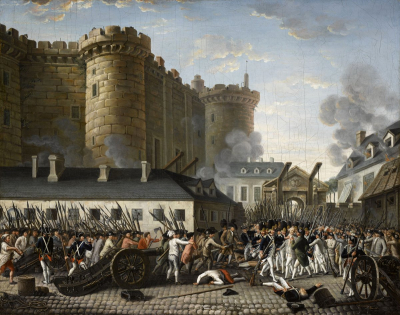The drownings at Nantes (French: noyades de Nantes) were a series of mass executions by drowning during the Reign of Terror in Nantes, France, that occurred between November 1793 and February 1794. During this period, anyone arrested and jailed for not consistently supporting the Revolution, or suspected of being a royalist sympathizer, especially Catholic priests and nuns, was cast into the river Loire and drowned on the orders of Jean-Baptiste Carrier, the representative-on-mission in Nantes. Before the drownings ceased, as many as four thousand or more people, including innocent families with women and children, died in what Carrier himself called "the national bathtub".
The French Revolution (French: Révolution française [ʁevɔlysjɔ̃ fʁɑ̃sɛːz]) was a period of radical political and societal change in France that began with the Estates General of 1789 and ended with the formation of the French Consulate in November 1799. Many of its ideas are considered fundamental principles of liberal democracy, while phrases like liberté, égalité, fraternité reappeared in other revolts, such as the 1917 Russian Revolution, and inspired campaigns for the abolition of slavery and universal suffrage. The values and institutions it created dominate French politics to this day.Its causes are generally agreed to be a combination of social, political and economic factors, which the existing regime proved unable to manage. In May 1789, widespread social distress led to the convocation of the Estates General, which was converted into a National Assembly in June. Continuing unrest culminated in the Storming of the Bastille on 14 July, which led to a series of radical measures by the Assembly, including the abolition of feudalism, the imposition of state control over the Catholic Church in France, and extension of the right to vote.
The next three years were dominated by the struggle for political control, exacerbated by economic depression and Civil disorder. Opposition from external powers like Austria, Britain, and Prussia resulted in the outbreak of the French Revolutionary Wars in April 1792. Disillusionment with Louis XVI led to the establishment of the French First Republic on 22 September 1792, followed by his execution in January 1793. In June, an uprising in Paris replaced the Girondins who dominated the National Assembly with the Committee of Public Safety, headed by Maximilien Robespierre.
This sparked the Reign of Terror, an attempt to eradicate alleged "counter-revolutionaries"; by the time it ended in July 1794, over 16,600 had been executed in Paris and the provinces. As well as its external enemies, the Republic faced internal opposition from both Royalists and Jacobins and in order to deal with these threats, the French Directory took power in November 1795. Despite a series of military victories, many won by Napoleon Bonaparte, political divisions and economic stagnation resulted in the Directory being replaced by the Consulate in November 1799. This is generally seen as marking the end of the Revolutionary period.

1793Nov, 16
French Revolution: 90 dissident Roman Catholic priests are executed by drowning at Nantes.
Choose Another Date
Events on 1793
- 21Jan
Louis XVI of France
After being found guilty of treason by the French National Convention, Louis XVI of France is executed by guillotine. - 23May
Flanders Campaign
Battle of Famars during the Flanders Campaign of the War of the First Coalition. - 23Jul
Mainz
Kingdom of Prussia re-conquers Mainz from France. - 27Aug
Siege of Toulon
French Revolutionary Wars: The city of Toulon revolts against the French Republic and admits the British and Spanish fleets to seize its port, leading to the Siege of Toulon by French Revolutionary forces. - 5Sep
French National Convention
French Revolution: The French National Convention initiates the Reign of Terror.

 English
English  español
español  français
français  português
português  русский
русский  العربية
العربية  简体中文
简体中文 